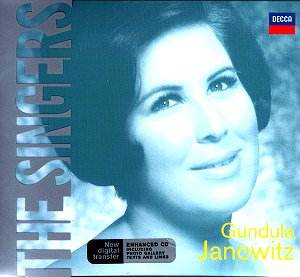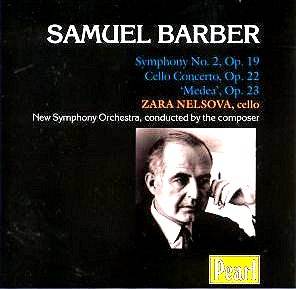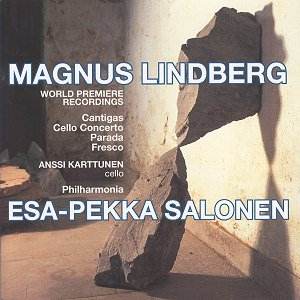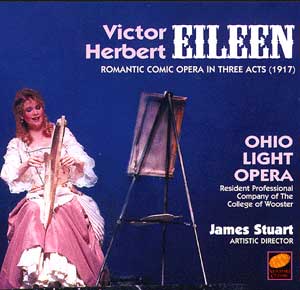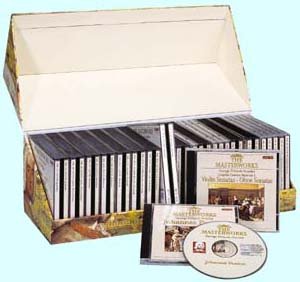 Composer: Georg Friedrich Handel
Composer: Georg Friedrich Handel
Works: Jephtha, Judas Maccabaeus, Solomon, Belshazzar, Messiah, Brockes Passion, Johannes Passion, Acis & Galatea, Imeneo, Faramondo, Coronation Anthems, Cantatas, Deutsche Arien, Water Music, Music for the Royal Fireworks, Concerti Grossi Op. 3, Organ Concertos (Complete), Chamber Music (Complete)
Performers: RIAS Kammerchor, Akademie für Alte Musik Berlin, Marcus Creed; English Chamber Orchestra, Johannes Somary; Berliner Singakademie, Kammerorchester Berlin, Dietrich Knothe; Capella Savaria, Nicholas McGegan and Pál Németh; Ama Deus Ensemble, Valentin Radu; Brewer Chamber Orchestra, Rudolph Palmer; Holland Boys Choir, Sir David Willcocks; Arleen Augér; Consort of London, Haydon Clark; Scottish Chamber Orchestra, Gibson; Franz Liszt Chamber Orchestra, János Rolla; Neues Bachisches Collegium Musicum, Max Pommer; Ivan Sokol, organ; L’Ecole d’Orphée
Recording: Complete Brilliant Masterworks
Label: Brilliant Classics
Georg Friedrich Handel’s oeuvre is a vast and varied landscape, encompassing opera, oratorio, and chamber music that reflects the composer’s adaptability and flair for dramatic emotion. The recent release of the complete “Brilliant Masterworks” offers a comprehensive survey of Handel’s diverse output, spanning a remarkable 40 CDs. This collection not only showcases the well-known masterpieces—such as “Messiah” and “Water Music”—but also delves into lesser-known works, providing an essential resource for both the casual listener and the dedicated Handelian.
The performances in this box set exhibit a wide range of interpretative approaches and recording qualities. For instance, Johannes Somary’s renditions of “Judas Maccabaeus” and “Solomon” may sound dated, yet they retain a certain charm and emotional resonance. The lush vibrato of the strings and the robust choral singing evoke a nostalgic sound world, characteristic of mid-20th century interpretations. Notably, the soloists, including the esteemed bass John Shirley-Quirk, deliver commendable performances that capture the essence of Handel’s lyrical lines, despite the occasional overuse of vibrato that might alienate modern listeners accustomed to historically informed practices.
While some recordings, such as Arleen Augér’s “German Arias,” shine with the brilliance of a renowned soprano at her peak, they are not without flaws. The accompaniment, though featuring period instruments, occasionally suffers from an imbalance, with the violin demanding too much attention in the mix. This highlights a broader issue within the collection: the engineering quality varies significantly, with some performances sounding overly modern in their orchestral balance, detracting from the intended clarity of Handel’s intricate textures. The Organ Concertos, while showcasing the virtuosic talents of organist Ivan Sokol, also reflect this inconsistency, as the orchestra often overwhelms the organ in passages that should allow the solo instrument to soar.
Amidst the variable quality, the chamber music performed by L’Ecole d’Orphée represents the high point of the compilation. The ensemble’s commitment to period performance practices brings a freshness to Handel’s trio and sonata works, with the clarity of the instrumental lines and the nuanced interplay of voices demonstrating Handel’s genius in writing for smaller forces. This section stands in stark contrast to some of the more traditional interpretations found elsewhere in the set.
Overall, the “Brilliant Masterworks” collection is a testament to Handel’s enduring legacy, encapsulating both the grandeur and intimacy of his music across a wide spectrum of recordings. While certain performances may not withstand the rigors of modern scrutiny, the set as a whole offers invaluable insights into Handel’s versatility as a composer. For those willing to navigate its varying quality, this compilation presents a treasure trove of both celebrated and obscure works, making it a worthwhile addition to any classical music library.
